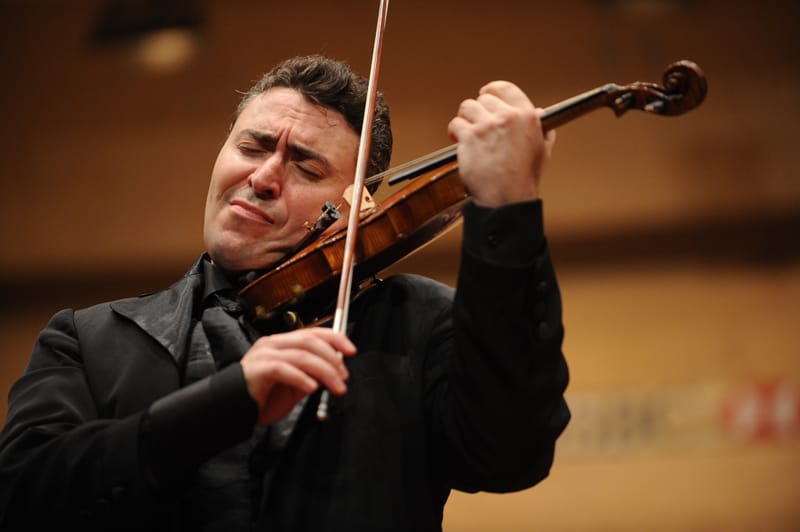What makes a good masterclass?

The audience waits excitedly: some are masterclass veterans and some are new to the experience; some have copies of the music on their laps, some have the music in their heads. There are teachers, parents and other young players; there is an atmosphere of hushed reverence and expectation. The young musician (who has worked hard in preparation) sits nervously wondering what the forthcoming encounter will bring. The master enters…
The stage is now complete. The three participants of a masterclass are finally assembled together: master, learner and audience – but the success of what is about to happen is very much in the hands of the master.
Music masterclasses come in all sorts of shapes and sizes. Those with a very specific brief, and delivered by an authority on the subject shouldn’t really go wrong. A masterclass on ‘the interpretation of mordents in the late keyboard sonatas of Domenico Scarlatti’ is probably going to cut the mustard pretty effectively. Some masterclasses are more ‘modern’ and the master may spend much of the time exploring, for example, creativity. In this article I’m going to look at the more generic kind of masterclass where the student prepares a piece and plays to a master who, in some way or another, is going to try to influence their performance, hopefully for the better.
So what exactly is a masterclass? Liszt was one of the first teachers to give masterclasses. It was a platform for teaching and sharing ideas with a group of students. And so that therefore is our first principle of the good masterclass: acknowledging and sharing with the audience. Some masterclasses are little more than a public lesson, a one to one, with the audience as passive onlookers. As far as the master is concerned the audience may or may not be there – they are of little concern. That’s okay and (in the hands of a good teacher) may be reasonably informative, but it’s not really in the spirit of the game. The master who ignores the audience is letting down one of the three participants. The expert masterclass presenter engages the audience, who become more than note-taking observers. They are individually and emotionally drawn in to the occasion, which means they get so much more out of it. And the master draws on their collective energy to enhance his or her own. This doesn’t mean the master need ask the audience questions or get them (physically or mentally) to take part in actual activities – though some masters do. The skilled master simply makes contact through the innate generosity of his or her own personality.
The second principle, perhaps the most important, is to have the ability instantly to understand the needs of the student. The ability instinctively to pick up and recognise what the student can and can’t do and what would be most helpful in allowing them to travel deeper into their music making. In other words, the ability to empathise. Some masters can go no further than ‘this is how I play it and I’m here to show you how to do it more like me’. Perhaps that may be sufficient? But that’s not really the stuff of the really effective masterclass. Effective masterclass presenters also have the related ability to put their students at (reasonable) ease. It’s often pretty nerve-racking being the student – though some students have remarkable confidence, some verging on arrogance, but that’s another matter. For most students, if their self-esteem is preserved then the potential for exciting discovery is very strong.
The third principle is that the master needs to have something interesting to say. I’ve sat through countless boring masterclasses where masters have felt their role is simply to make alternative performance suggestions. Play this a bit louder/softer/faster/slower. Phrase it like this. Try this fingering. Use less pedal. These kinds of hints and tips may or may not be useful, but we want more from such an occasion. I want a master to challenge my thinking; to take my imagination to places I may not have been to before. I don’t mind if some of the ideas presented are too extreme, not physically possible, or defy commonly held or received opinions. In fact the masterclass may well be all the better for such provocative and stimulating content. Some of the very best masterclasses I’ve encountered have been given by musicians who have profoundly questioned the nature of music and the nature of learning. Where the masterclass itself was much more about asking questions than providing answers. I’ve often come away seriously enthused by such occasions.
The fourth principle is the importance of communication. The master and student need at least to be speaking the same musical language (if not always the spoken language). Such an occasion is ripe for much misunderstanding – inevitably the master may make many assumptions and the potential for confusion and misconstruction is considerable. The student will rely heavily on words and expressions that mutually express a common meaning. If the master doesn’t achieve this the student will take away little from the encounter.
The fifth and final principle is that a good masterclass needs to be entertaining. And I don’t use the word in the sense of being ‘funny’ or lightweight. A masterclass can be very serious with profound teaching taking place, but at the same time it can be delivered with a winning and appealing touch. Well placed humour plays a vital role in engaging all three participants, and can very helpfully serve to ‘break the ice’, putting both audience and player more at ease.
For a masterclass to be successful and effective, the master’s ego will be held in check. Virtually all masters will have something of an ego, which is generally okay and to be expected. But with the ego firmly under control, the truly helpful master can build confidence, open the student’s mind and guide them, sensitively, down new avenues of thought and experience. The event is not used as a platform for the master to show off. Worse still is any ‘master’ who leaves a student upset or embarrassed or doubting their worth – to be avoided at all costs.
Let’s have a look at the approach of some specific masters.
As with all things in life, we can now encounter some of the greatest masters simply by switching on our desktop computers and trawling through YouTube. There you will find, at no cost, masterclasses by some of greatest musicians of the recent past. It’s an astonishing resource: Heifitz, Casals, Segovia, Michelangeli are all there. But I’d particularly like to share three of my (many) favourites, each delivering their classes in a highly contrasting ways.
Firstly there is Daniel Barenboim. Barenboim is a very deep thinker. You may not agree with all his thoughts, but they are incontestably provoking and stimulating. His masterclasses on the Beethoven Sonatas (available as a DVD set and some are on YouTube) are very special. His metaphors are drawn from a deep consideration of the very meaning of life and he can use words to connect us with some very weighty imponderables. He has thought deeply about the syntax of music and presents his opinions with respect, directly and with great integrity.
Then there is the Portuguese pianist Maria João Pires. She has an astounding imagination and unusual masterclass technique. There’s not much ‘telling’ going on. Instead, she spends a lot of time asking questions and challenging why we do what we do. Fascinating stuff.
The third is the incomparable Maxim Vengarov. Vengarov is hugely entertaining – he makes us laugh. But in that laughter there is phenomenal teaching taking place. His imagination knows no bounds and he comes up with wonderful and extraordinary metaphors and images that vividly bring the music to life and allow us to play with enormous ambition. His joie de vivre is infectious. I also had the very good fortune to attend a Vengarov masterclass where he showed another side of his considerable musical personality: here there were few colourful analogies but many deep insights into the nature of the pieces on which he and the student were working.
These are just three among many. The common features are their energy, which never falters, and their challenging and engaging approach.
So what does make a good masterclass? In addition to the five principles I’ve identified, it will be both inspirational and aspirational, leaving the students who take part and those audience members who play or teach with a burning desire to get back to the coal face and practise, teach or perform with a greater sense of awareness and enthusiasm. It will affirm the beliefs, hard work and diligence of those involved and the experience will be, to some degree, truly life-enhancing.
This article first appeared on the blog section of the author.





